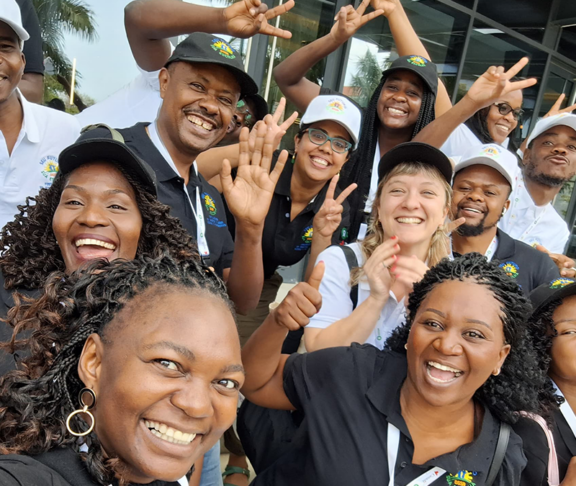Through health services, education, and advocacy, an
Oxfam project is strengthening young women’s sexual and reproductive health and rights.
Mihret was just 17 years old when she married Berhane. Following community norms in
Ethiopia, Berhane pressured Mihret to have a child at the age of 19.
His opinion began to change when he saw how much pain Mihret experienced during childbirth and when he and Mihret struggled to feed their child on his low income. But he felt the pressure from those around him for his wife to have more children and began pushing Mihret to have another child.
When Berhane heard about a self-help group organized by a partner of the Her Future, Her Choice (HFHC) project, he encouraged Mihret to join. Mihret learned about contraception and received a loan to open a vegetable business. Berhane attended the group’s family dialogue sessions, where he learned about the importance of contraception and women’s financial independence and decision-making.
Berhane is no longer pushing Mihret to have more children. “Now, we’re focused on growing my wife’s business and providing better living conditions for our child,” he says.
Inspiring change for girls and young women
Berhane and Mihret’s story is just one example of how Oxfam and partners have made real change for adolescent girls and young women in regions of Southern and Eastern Africa, where they face harmful cultural practices, taboos surrounding sexuality, and lack of access to sexual and reproductive health information and services. Adolescent girls in these regions have limited decision-making and control over their bodies, lives, and health. They experience child, early, and forced marriage; gender-based violence; teenage pregnancy; unsafe abortion; and early parenthood. As a result of teenage pregnancy and a lack of support, they are forced to drop out of school.
HFHC has improved sexual and reproductive health and rights for young women in targeted districts of Ethiopia, Malawi, Mozambique, and Zambia. Through this project, Oxfam and partners have worked with young women and men, parents, teachers, and other community members to change discriminatory norms and attitudes and strengthen the autonomy of teenage girls and young women. It also trains health service providers, supports health facilities to provide high-quality sexual and reproductive health services, and promotes change in sexual and reproductive rights and health-related laws and policies.
Over the last five years, HFHC initiatives have helped reduce teen pregnancies, led to a positive shift in attitudes regarding sexual and reproductive health and rights, and increased access to contraception, safe abortion care, and youth-friendly health care.
What worked?
Bringing traditional, community, and religious leaders on board

Anabela Antônio
Revered Matron & Religious Leader in the Marcuza
Community,
Mocuba District, Mozambique
Anabela Antônio is a revered matron and religious leader in the Marcuza community of Mocuba District, Mozambique. Young women in her community experience sexual violence and child marriage. Due to poverty and lack of education, families often feel the need to marry off their daughters at a young age.
Anabela used to conduct initiation practices to signify a girl’s passage into adulthood. The girls would spend weeks in the forest going through cultural training, before returning for early marriages and pregnancies. Pregnancy typically meant the end of formal education.
Anabela’s transformation began when she got involved in the “Girl Go Back to School” campaign. She learned about premature marriage, gender-based violence, and sexual and reproductive health and rights. This helped her see the role initiation practices played in fostering early marriages. She began advocating for legal age limits for marriage and encouraging the education of girls until 18. Her efforts have helped get girls back into school and inspired them to continue their education.
For Anabela, abandoning initiation practices meant losing her primary source of income, as families paid for their daughters to undergo the rituals. Since then, she has turned to farming to support her livelihood.
Training health service providers

Photo: Alex Wilson/Oxfam Canada
Before 2020, Namwala District in Zambia saw a high rate of teenage pregnancies. One major gap was the lack of trained health care providers to offer comprehensive contraception services, including long-acting reversible contraception (LARC). LARC includes the intrauterine device (IUD) and the contraceptive implant, which are effective forms of contraception that reduce the need for repeat clinic visits. Through HFHC, Masauso Banda, a registered nurse and midwife, was trained to offer a range of contraception services. Campaigns and peer education also addressed the stigma of contraception.
Traditional leaders, including the local chief, played a critical role in increasing community acceptance of these initiatives. Masauso also mentored his colleagues so that more health service providers could offer LARC services. The community began to understand the benefits of contraception, particularly in preventing teenage pregnancies.
Advocating for change with the government
HFHC has also contributed to changes at the national and local policy levels. In Malawi, Oxfam and partners worked with other organizations to push for increased funding in the national budget. This led to a 13 per cent increase in funding for sexual and reproductive health in the 2023-24 budget, followed by an increase in the national health budget from 8.5 per cent to 12.2 per cent for 2024-2025.
Together with local organizations, through projects such as Her Future, Her Choice, Oxfam is advancing women’s and girls’ rights and putting sexual and reproductive health decision-making in their hands — where it should be.
To learn more about such impacts, visit oxfam.ca or sign up for the Oxfam Canada Newsletter.




